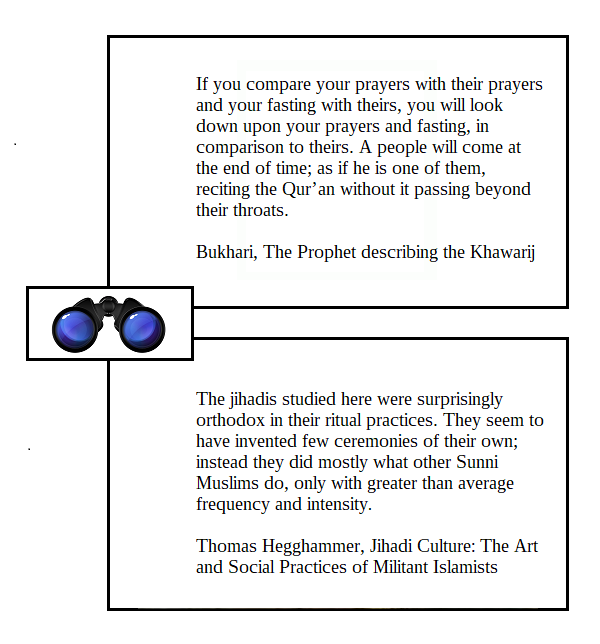[ by Charles Cameron — both answers are true in different contexts — IMO a significant point that previous discussion has tended to overlook ]
.
Were (are) the Khawarij Muslim? That’s the question I keep thinking of when discussion of whether IS (or AQ) is Islamic comes up. From a Muslim perspective, they were heretics. Joas Wagemakers identified the central distinctive opinion of the Khawarij thus:
The first of these is the Khawarij’s belief that revolt against Muslim rulers was allowed if they were deemed insufficiently pious. When ‘Ali accepted arbitration with Mu‘awiya, the people later known as Khawarij reportedly shouted ‘judgement is God’s alone’ (la hukm illa li-llah). In the context of that event, this referred to their belief that only God had the authority to arbitrate, not human beings, and that ‘Ali should not have accepted Mu‘awiya’s offer. The slogan later came to represent their broader view that all judgements and rulings should be left to God, thus applying Qur’anic rulings so strictly that they expelled Muslims guilty of major sins from their community and fought them. Because they believed sinful Muslims to be unbelievers (kuffar, singular: kafir), they directly applied passages from the Qur’an pertaining to jihad against non-Muslims to those of their co-religionists who were less than perfectly pious.
From the perspective of what I’m going to call “ongoing Islam” they were heretics — the very name Khawarij indicates those who have gone out, ie left the religion of Islam — and yet their heresy was that of “fundamentalizing” Islam, being, if you like, excessively Islamic.
Consider: according to a hadith reported in Abu Dawud:
The Messenger of Allah, peace and blessings be upon him, said, “There will be dissension and division in my nation and a people will come with beautiful words but evil deeds. They recite the Quran but it will not pass beyond their throats. They will leave the religion as an arrow leaves its target and they will not return until the arrow returns to its notch. They are the worst of the creation. Blessed are those who fight them and are killed by them. They call to the Book of Allah but they have nothing to do with it. Whoever fights them is better to Allah than them.”
As a student of religions might say, their use of the Qur’an marks them as clearly Islamic, and as a Muslim theologian might say, they have clearly departed the religion, in truth “they have nothing to do with it.”
Many contemporary Muslims would say of IS, its leader and members, that they “call to the Book of Allah but they have nothing to do with it” — and they have every right to say that. Those, however, who wish to understand what drives IS do well to understand the theology and eschatology involved, as well as the psychology of the passions they invoke — and also the Islamic context in which IS may well be viewed as having by the very nature of their excesses left the religion..
**
This post is copied wholesale from a fascinating conversation among friends (Mark Safranski, J Scott Shipman, Michael J. Lotus, Dan Tdaxp, Joshua Treviño, Lynn Rees and others) in response to Tanner Greer’s post Vox Will Never Understand Islam… Or Any Religion, Really, which is itself a response to a Vox piece by Max Fisher, The perfect response to people who blame Islam for ISIS.
Please share this post if you find it helpful.



